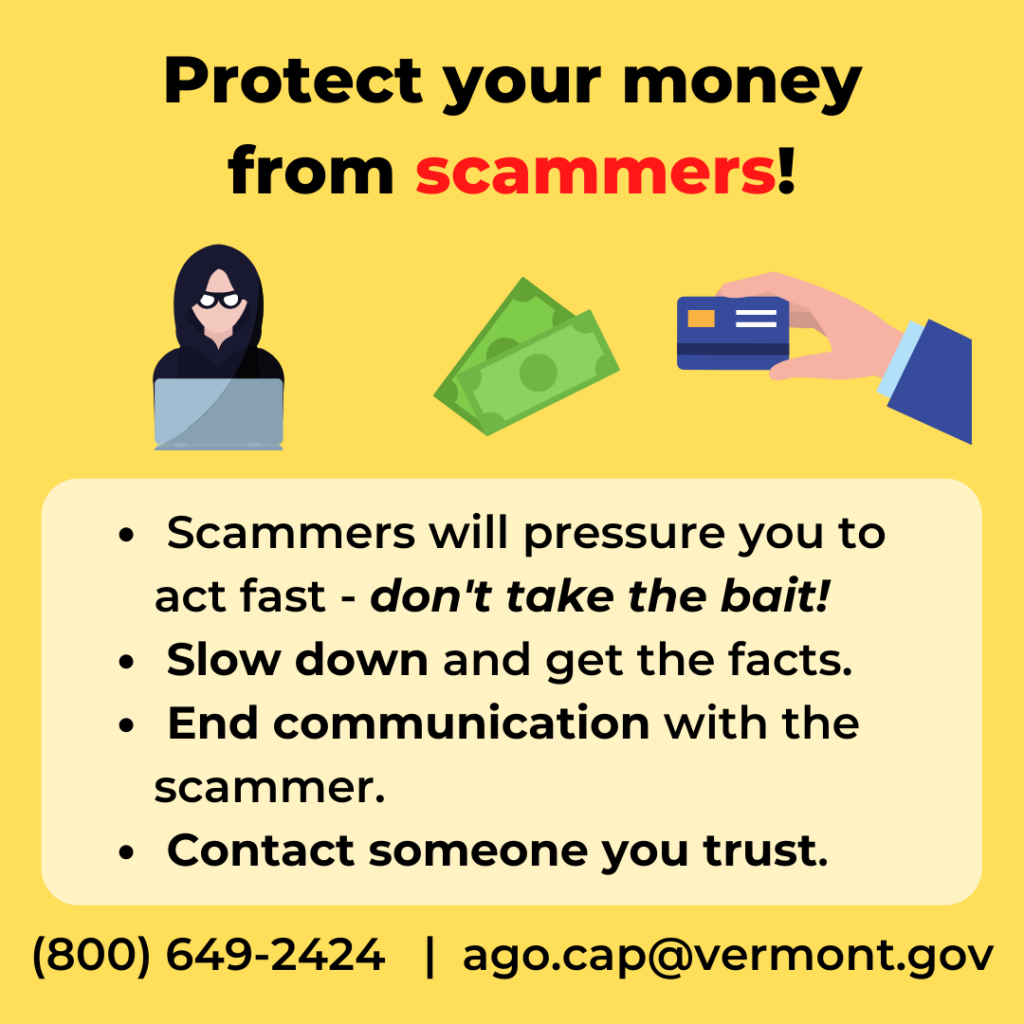Unfortunately, many scam encounters result in monetary loss in Vermont. In 2020, 249 Vermonters lost approximately $1.5 million to scammers. The most common scams associated with monetary loss were imposter scams (scammers posing as friends, family members, or romantic interests) and online classified listing scams (scams perpetrated on sites such as Craigslist or Facebook Marketplace). Scammers ask their victims to send money using a variety of methods, including gift card transactions, peer-to-peer payments apps like Venmo or CashApp, wire transfers, and cash or checks in the mail.
Here are 5 things you can do to avoid experiencing a scam with monetary loss:
- Don’t send money to someone you don’t know. This may sound simple, but it’s an important tip to remember. Take it slow. Scammers will pressure you to act quickly or face serious consequences. Do not provide unsolicited callers with your credit card or bank account numbers. If you are asked to send money via gift cards, wire transfer, cash in the mail, or peer-to-peer payment apps, it’s a scam.
- Gift cards are for gifts and should be treated like cash. If you are asked to provide payment over the phone or via email using gift cards, it’s a scam. Typically, the scammer will ask you to purchase gift cards at a local grocery store or pharmacy, asking that you provide the numbers on the back of the card. In 2020, Vermonters lost approximately $128,000 to gift card scams (as reported to CAP). For more information about gift card scams, visit our Gift Card Scams blog post.
- If it’s too good to be true, it’s not true. Scammers who perpetrate “free money” scams promise cash prizes, cars, and even grant funding in exchange for payment up front. Free money is always free. If you are asked to pay fees to receive a prize or grant, it’s a scam.
- Scammers know exactly what to say. To get your money, scammers will often feed their victims lines to use with bank clerks or cashiers in order to push through unusually large withdrawals, transfers, and purchases. They may ask you to say that the money is for a family member or a significant purchase to avoid suspicion from bankers and retailers.
- Do not share personal or financial information with unverified contacts. Legitimate organizations and businesses will not call, email, or text you for your sensitive personal information. Scammers may claim there has been fraud and you need to verify your information – don’t take the bait. End communication with them and contact the associated business or organization using verified contact information.

BONUS TIP: Look out for the scams below, which were associated with 95 of the 249 scam with loss reports we received in 2020:
Imposter Scams / Phony Relationship Scams
The scam: There is a wide variety of phony relationship scams. Sometimes, the scammer pretends to be someone you know, like a love interest, friend, relative, or even a religious leader. They typically reach out to you online or on the phone, claiming to need money.
How to spot the scam: They ask you to send money immediately, often in the form of wire transfers or gift cards. If you met the person online, but they refuse to video-chat or talk on the phone.
What to do: If they claim to be someone you know, call the person using a verified phone number. If you receive a suspicious email, be sure to double-check the email address. If you’re feeling suspicious, get the real story and talk to someone you trust. Cut off communication with the scammer. If you receive an email from a friend or coworker asking for money, do not send money. Be sure to call that person directly—it’s most likely a scam.
Online Classified Listing Scams
The scam: Sometimes the scammer responds to a seller post, overpays with a check, and asks for the remainder to be wired back. Sometimes the post is for a fictitious rental property and the scammer is looking for the deposit and first month’s rent to be sent immediately. Scams even happen when you are looking for that perfect puppy or pet to expand your family, but the transport of the animal is supposedly held up at the airport or elsewhere.
How to spot the scam: If you feel suspicious, stop the sale or purchase. The scammer may ask you to wire them money, send a bank transfer, or pay using gift cards. They may not want to talk on the phone or meet in person. Remember, you should not provide a rental deposit before signing the lease or contract in-person.
What to do: Complete your transactions in cash and preferably in-person. If they refuse to meet in-person or talk on the phone, ignore them and end communication.
For more information about avoiding monetary loss and fraud, visit the Federal Trade Commission’s website:
- How to Avoid a Scam
- Using Money Transfer Services
- Money Wiring Scams
- Fake Checks
- Paying Scammers with Gift Cards
Have you experienced monetary loss due to a scam? Report it to CAP:
Call (800) 649-2424 OR Complete the Vermont Attorney General’s scam reporting form.
Contributing Writer: Madison Braz
Content Editor: Crystal Baldwin
